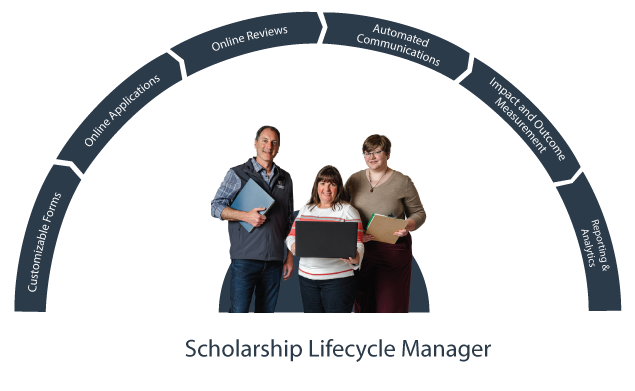Scholarship Management
Easy scholarship management – start to finish.
Scholarship Providers
Eliminate manual and repetitive tasks. Automate your scholarship lifecycle to spend more time connecting to your applicants.
Make every aspect of scholarship management more efficient.

Oversee all activities related to scholarship management with Foundant’s solutions designed to help your organization lead impactful projects and create positive, meaningful impact.
- For scholarship providers, expedite scholarship program design, promote funding opportunities, enhance review committee access, streamline approvals and awards, automate award status communication, and analyze project impact.
Scholarship management services & solutions
Manage your entire scholarship lifecycle
Organize, manage, and streamline your scholarship workflow. Efficiently create or modify applications, streamline sorting, scoring, and managing documents for a smoother, easier experience.
Online scholarship acceptance and renewal
Unlimited follow-up forms streamline the process and cover everything recipients need to do after acceptance – from thank-you letters to enrollment verification. Automated reminders and post-acceptance information can be submitted online, making tracking easy. Manage multi-year awards, renewable scholarships, and payment commitments seamlessly.
Measure impact and outcomes
Collect all types of data and stories such as graduation rates, enrollment numbers, and financial disbursements to help measure program impact.
Build customizable reports
Choose the data you wish to analyze and transfer it to our report builder, where you can customize and dissect it according to your preferences.
Matching criteria
Get qualified students into applications and ensure no scholarship goes unfulfilled. Foundant’s matching criteria features save valuable time and improve the experience for both applicants and administrators.
Reporting and analytics
Throughout the scholarship lifecycle, data is collected from applicants, third parties, reviewers, and staff. Imagine being able to quickly and easily access this information in one location to share your story with stakeholders.
Improve your applicants’ submission experience
Easy scholarship application software allows applicants to spend less time navigating the submission process. Provide applicants peace of mind with auto-save and the ability to copy from previous applications.
Foundant Fans
Become a happy client!
Foundant has strong, relevant products for community foundations. It is focused on keeping its products up to date and has excellent customer service.”

Meghan Warrick
Central Florida Foundation
It’s been a great solution to meet our accounting and CRM needs. The GLM and SLM modules have made our operations more efficient.”
Preeti Francis
Community Foundation of Greater Huntsville
I was not at the Foundation before we adopted Foundant products- but I can’t imagine how labor-intensive everything was without it. I come from a 16+ year background in education, and I never worked with a software company that was as helpful and responsive as Foundant.”

Hailey Carmer LaMaster
Community Foundation DeKalb County

Ready to explore our scholarship management software?
Get a demo and discover why 2,600+ funders continue to rely on Foundant for their grant and scholarship programs.
Scholarship management FAQ’s
What is the purpose of a scholarship management system?
A scholarship management system is a cloud-based software solution that helps funding organizations track the status of applications, review processes, and improve trust and accountability for scholarships, bursaries, or individual grants workflow.
A system can streamline the scholarship process by allowing applicants to submit, organize, edit, and track their applications with ease. Additionally, it enables scholarship coordinators to generate detailed outcome reports, deliver funds more efficiently, and ensure transparency and fairness in the process.
What does a scholarship manager do?
A scholarship manager plays a crucial role in overseeing scholarship programs. Scholarship managers qualify and distribute scholarship applications and reports, process scholarship checks, manage the scholarship database and compile reports. These professionals ensure fair distribution of funds, enhance the donor and recipient experience, and contribute to educational opportunities for students.
Key activities include:
- Implement and promote the foundation’s annual scholarship application process(es).
- Recruit and train scholarship selection committees, ensuring compliance with eligibility requirements and policies.
- Serve as the primary point of contact for students, parents, counselors, and college representatives.
- Maintain scholarship software and manage accurate distributions.
- Outline a program’s strategy and its objectives and oversee a list of dependent projects that are needed to reach the program’s goals.
- Create awareness of the scholarship program within the community and build donor relationships.
How do you organize a scholarship?
Many scholarship administrators wear multiple hats. And busy days make it difficult to spend time assessing current workflows. But taking time for assessment and planning can be instrumental in creating strong yet flexible processes that can help the coming years run smoothly and efficiently.
- Effective scholarship programs start by asking why they exist. By understanding their purpose, scholarship providers can set specific goals for the program to better measure results.
- Establish scholarship program criteria. Common award criteria includes GPA, financial need, athletic ability, skills, creative content, demographics, and so on.
- Develop a communications plan. Include how you plan to promote the scholarship program and key communications partners.
- Set up an application process. Outline an implementation plan and timeline. Consider academic calendar, financial aid process, tuition due dates, etc. There are tools you can use to build a successful application process, so consider what the best tool is for your organization and evaluate both for your current processes and future growth.
- Evaluate applicants. Ensure you have successfully trained evaluators who understand what is expected of them and how the process will go. These evaluators should understand your criteria and timeline and be assigned specific due dates.
- Award the scholarships. This is the fun part! Once you’ve received your applications and completed the evaluation cycle, it’s time to give away money. However, this often sounds easier than it is, and most applicants won’t grasp the complexities. A key piece is to ensure you know ahead of time whether your award will be paid directly to the student or if it will go to the school and directly onto tuition.
- Implement a program evaluation plan. This can involve implementing a logic model, activity reports, end-of-term scholar surveys, post-award surveys, alumni surveys, and scholarship reviewer reports and surveys.